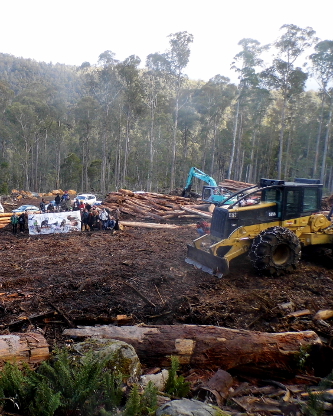Closed talks in Tasmania to chop up tree deal
 The newly-elected Tasmanian government has made the first cuts in its effort to fell the Tasmanian Forests Agreement.
The newly-elected Tasmanian government has made the first cuts in its effort to fell the Tasmanian Forests Agreement.
Premier-elect Will Hodgman has charged headlong into fulfilling his pledge to tear up the deal, which was forged after decades of conflict and years of negotiation.
The new government has held talks with the all groups it considers interested parties, barring environmental groups, community interests and unions. This meant several factions who were signatories to the original deal were not allowed to engage in its re-negotiation.
The Forest Industry Association's Terry Edwards has all but given up on the deal, saying that after less than three years that the “world had moved on”.
“The TFA itself is no longer relevant because we have a government that was elected to tear it up,” he said after the meeting.
“I think the clear mood in the room was one of positiveness about having a positive and majority stable government and there was a respect for the mandate that had been obtained by the government-elect last Saturday.”
Mr Hodgman says he is doing what he was recently elected to do.
“I'm sick to death of Tasmania being treated as the environmental conscience of the rest of the country,” he told the ABC.
“We've got an agenda and a mandate to deliver on our election promises and I'm sick of seeing governments in this state being held to ransom, 'green-mailed' by environmentalists who have no interest in Tasmanian jobs.”
“I hope and expect that those who propose to go in and damage business, to damage people's livelihoods, to damage our economy will not do so because Tasmanians have spoken,” he said.
The Tasmanian Sawmillers Association is concerned the repeal could re-ignite forest fights that plagued the industry in recent years, but says the talks are moving in a positive direction.
“If we're able to access resource, we can increase the employment level and that's where we're looking at the positives of it,” TSA’s spokesperson Shane Rice told the ABC.
“We'll take on the protest actions as and when they arise... we think we can cope with it, particularly in our sector of the industry.”








 Print
Print